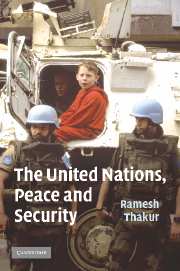Crossref Citations
This Book has been
cited by the following publications. This list is generated based on data provided by Crossref.
Makinda, Samuel M.
2001.
An Introduction to International Relations.
p.
373.
Devetak, Richard
Burke, Anthony
and
George, Jim
2001.
An Introduction to International Relations.
Lindeman, Ole Andreas
2007.
Humanitær handlingsnorm og internasjonal sikkerhetskonsensus.
Norsk statsvitenskapelig tidsskrift,
Vol. 23,
Issue. 1,
p.
30.
Coletta, Damon
2007.
Unipolarity, Globalization, and the War on Terror: Why Security Studies Should Refocus on Comparative Defense.
International Studies Review,
Vol. 9,
Issue. 3,
p.
385.
Hatto, Ronald
and
Lemay-Hébert, Nicolas
2007.
Le multilatéralisme .
p.
129.
Chan, Lai-Ha
Lee, Pak K.
and
Chan, Gerald
2008.
Rethinking global governance: a China model in the making?.
Contemporary Politics,
Vol. 14,
Issue. 1,
p.
3.
Tuathail (Gerard Toal), Gearóid Ó
2008.
Russia's Kosovo: A Critical Geopolitics of the August 2008 War over South Ossetia.
Eurasian Geography and Economics,
Vol. 49,
Issue. 6,
p.
670.
2008.
BIBLIOGRAPHY.
Leiden Journal of International Law,
Vol. 21,
Issue. 1,
p.
229.
von Bredow, Wilfried
2008.
Perspektiven der politischen Soziologie im Wandel von Gesellschaft und Staatlichkeit.
p.
121.
Thakur, Ramesh
2008.
Global Governance and Diplomacy.
p.
288.
Cottey, Andrew
2008.
Beyond humanitarian intervention: the new politics of peacekeeping and intervention.
Contemporary Politics,
Vol. 14,
Issue. 4,
p.
429.
O’Driscoll, Cian
2009.
Ethics, Authority, and War.
p.
21.
Thakur, Ramesh
and
Weiss, Thomas G.
2009.
United Nations “Policy”: An Argument with Three Illustrations.
International Studies Perspectives,
Vol. 10,
Issue. 1,
p.
18.
Bellamy, Alex J.
2009.
Kosovo and the Advent of Sovereignty as Responsibility.
Journal of Intervention and Statebuilding,
Vol. 3,
Issue. 2,
p.
163.
Badescu, Cristina G.
and
Bergholm, Linnea
2009.
The Responsibility To Protect and the Conflict in Darfur: The Big Let-Down.
Security Dialogue,
Vol. 40,
Issue. 3,
p.
287.
Paul, Hannah
2009.
International Criminal Courts as an Architect of Sustainable Peace in Post-Conflict Societies.
SSRN Electronic Journal,
Bellamy, Alex J.
2009.
Realizing the Responsibility to Protect.
International Studies Perspectives,
Vol. 10,
Issue. 2,
p.
111.
Contessi, Nicola P.
2010.
Multilateralism, Intervention and Norm Contestation: China’s Stance on Darfur in the UN Security Council.
Security Dialogue,
Vol. 41,
Issue. 3,
p.
323.
Dunn, Lauren
Nyers, Peter
and
Stubbs, Richard
2010.
Western interventionism versus East Asian non-interference: competing ‘global’ norms in the Asian century.
The Pacific Review,
Vol. 23,
Issue. 3,
p.
295.
Ayoob, Mohammed
2010.
Making Sense of Global Tensions: Dominant and Subaltern Conceptions of Order and Justice in the International System.
International Studies,
Vol. 47,
Issue. 2-4,
p.
129.





